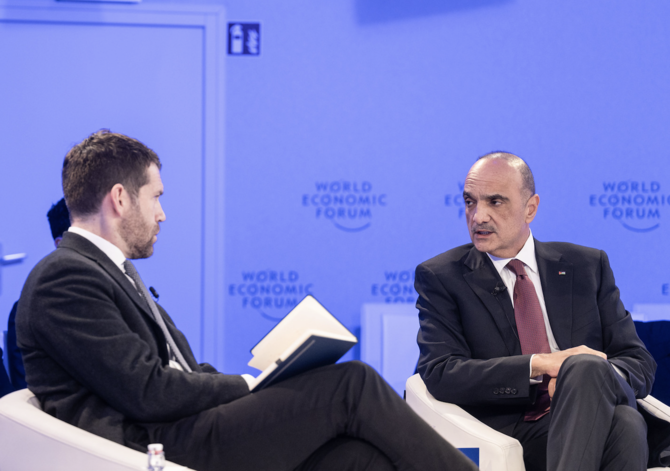DAVOS: The “carnage” happening in Gaza could lead to the radicalization of a generation and pose a serious threat to regional security, Jordan’s prime minister said on Tuesday.
Speaking to Daniel Kurtz-Phelan, editor of Foreign Affairs magazine, at the World Economic Forum in Davos, Bisher Khasawneh said that the impact of the war would have repercussions on both sides.
“My main concern is that the continuation of this, of the horrific scenes that we see of carnage in Gaza, of murdered children, of mutilated bodies, if it continues, it will create conditions that will deeper radicalize an entire generation on both sides of the divide.
“(This) in turn, I think would fundamentally not only endanger regional stability, but will be definitely a thorn in the side of global international peace and stability. And that could give rise to all sorts of manifestations of things that are less of a high profile, but with equal danger, including certain terrorist groups that are basically dormant today, like Daesh and Al-Qaeda, and to have them morph into something that’s uglier or more challenging.”
Peace with Israel remained a strategic choice but any push to drive Palestinians to Jordan would pose an “existentialist” threat, Khasawneh said.
If armed settlers, encouraged by the Israeli army, escalated the violence it could trigger a large scale Palestinian exodus to the other side of the Jordan River, he said.
The prime minister said he was also concerned by Israeli transgressions on Muslim and Christian holy sites in Jerusalem, of which Jordan’s King Abdullah is the custodian, and in the West Bank.
Israel’s response to Hamas’ Oct. 7 attack was “an aggression operation that operates in the context of self-defense” but also had “elements of definitions contained in the Geneva Conventions about war crimes and crimes against humanity.”
Khasawneh said humanitarian aid and medical supplies should be allowed to flow freely into the Gaza Strip, where most medical facilities have been effectively decommissioned due to a lack of staff and essential supplies.
Amman had used its armed forces to air drop medical supplies for its two hospitals in Gaza, he said.
“We’ve conducted joint operations on that front too for humanitarian goods, in tandem with France, and prior to that in tandem with Qatar and with the UAE. But again, today, what goes in is a trickle, it’s not more than 10 percent of what the actual needs of the Gazans are. We need to focus on getting a ceasefire immediately.”
King Abdullah had for the past 10 years been arguing that the “absence of a credible process and political horizon that fundamentally takes us to crossing the finish line on the front of materializing the two-state solution will always give credence and strengthen the counter-narrative and the counter-camp that sees violence as the way, and that does not basically see any value in peaceful cooperation, regional cooperation, peaceful coexistence and achieving a historic closure,” Khasawneh said.
He added that Jordan remained committed to comprehensive peace and its side of the Israeli-Jordanian peace agreement and peace accords, and called for an “end to the madness” and an immediate ceasefire “that then attaches to a context and a political plan that is different from previous attempts, that is benchmarked, timelined, with deliverables, identifying upfront that the objective is the materialization of a Palestinian state.”
If a ceasefire were not reached, “the next cycle of violence will be worse,” he said.
“The longer that this lasts, the more prospects we have that would endanger regional peace and stability and security.”





















